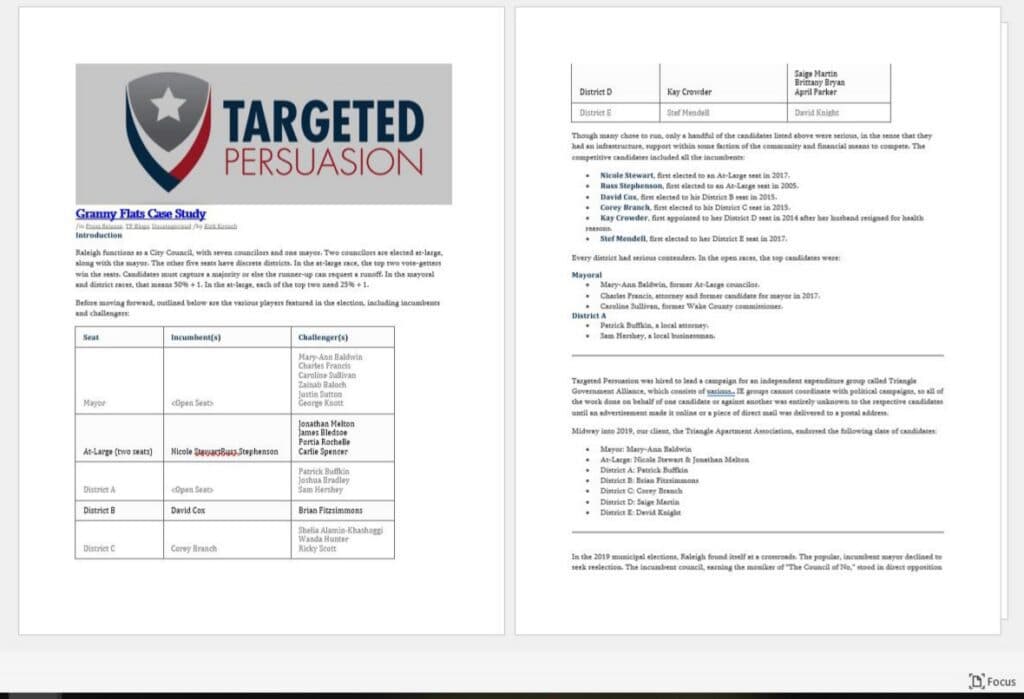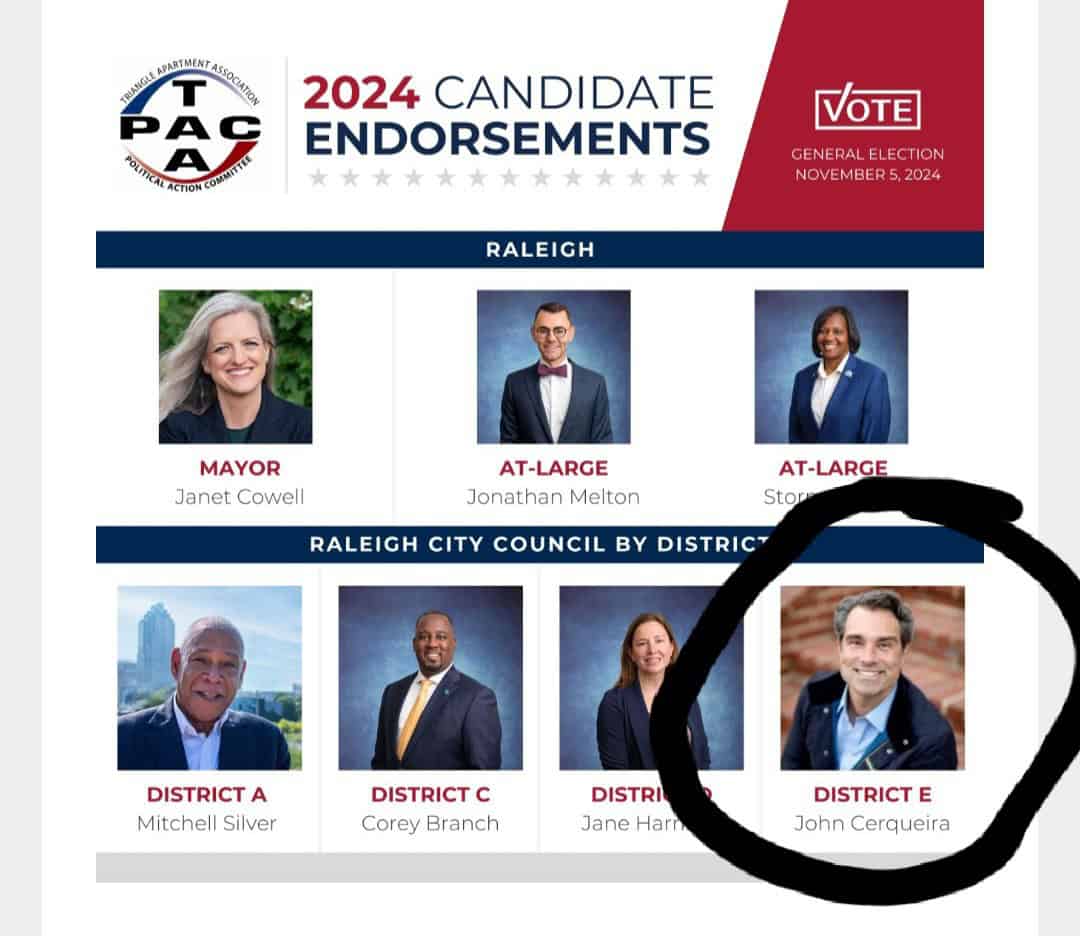If you’re a renter in Raleigh, this election season brings some key concerns to the forefront. The Triangle Apartment Association (TAA) has a track record of investing heavily to influence Raleigh’s leadership in ways that could affect renters. In 2019, the TAA funded a significant campaign—known as “Granny Flats”—which funneled $98,000 into a mix of mailers, ads, and social media aimed at unseating council members who didn’t align with their pro-landlord, pro-developer agenda. One major success story from this campaign? The election of David Knight in District E, who rubber stamped development in his term on council (and voted to dismantle CAC’s).
TAA’s Aggressive Campaign: The “Granny Flats” Strategy
The “Granny Flats” campaign, officially run through the Triangle Government Alliance sought to portray council members opposed to rapid development as obstacles to Raleigh’s growth. With $98,000 in funding, the campaign used a combination of negative ads targeting incumbents and positive ads supporting TAA-endorsed challengers, including David Knight. By casting incumbents as “out-of-touch” and positioning their own candidates as forward-thinking and pro-growth, TAA effectively influenced public perception. Ultimately, Knight and several other TAA-backed candidates won their races, giving TAA significant sway in Raleigh’s City Council.

The Knight–Cerqueira Connection: Why Renters Should Pay Attention
This election cycle, TAA has endorsed John Cerqueira for District E, positioning him as a candidate who will likely continue Knight’s legacy. Notably, David Knight himself was Cerqueira’s first donor, highlighting a clear connection and shared agenda. In addition, Cerqueira has received thousands of dollars from developers, which doesn’t bode well for Raleigh residents who want balanced, thoughtful leadership that considers the needs of our entire community, not just those of developers. For renters, this endorsement raises concerns about Cerqueira’s potential policies—especially given Knight’s strong support for TAA-backed development initiatives that some argue have driven up rent and reduced affordable housing options in Raleigh.

A Stark Contrast: Christina Jones’s Commitment to Affordable Housing
For Raleigh renters who are concerned about rising rents, District E incumbent Christina Jones provides a sharp contrast to Cerqueira. In her first term, Jones worked diligently to bring affordable housing options to District E, prioritizing balanced development and community needs over developer interests. Importantly, Christina Jones does not accept donations from developers or others whose income relies on development, underscoring her commitment to a council seat free from influence by those with vested financial interests in development. Jones’s track record in affordable housing and commitment to transparency set her apart as a candidate focused on creating a stable, livable Raleigh for all residents, especially renters.

Why TAA’s Support Could Spell Higher Rents for Renters
With the TAA’s endorsement in 2024, John Cerqueira’s campaign is set to benefit from similar support and potential funding streams from an organization with a vested interest in landlord and developer priorities. If elected, Cerqueira could champion policies that:
- Support New Developments, Raising Rents: History has shown that rapid development often drives up property values, which in turn increases rent. TAA’s pro-growth stance means prioritizing more high-end and luxury developments without necessarily including affordable housing.
- Favor Landlord Rights Over Renter Protections: TAA represents landlords and property managers, so policies that might benefit renters—such as rent control or stronger tenant protections—are often opposed by candidates they endorse.
- Encourage Gentrification: Districts with aggressive growth policies can push out lower-income residents and lead to higher rent across neighborhoods, often making it difficult for renters to stay in the communities they call home.
The Bigger Picture: TAA’s Influence on Raleigh’s Future
The TAA has invested in shaping Raleigh’s council in ways that benefit their members, often at the expense of renters’ affordability and stability. Their 2019 campaign had lasting effects on the council’s approach to housing and development, and the stakes are just as high this election cycle with their endorsement of Cerqueira. For renters in Raleigh, the connection between Knight and Cerqueira—and the additional support Cerqueira has received from developers—signals that he may lean toward policies favoring developers over residents’ needs.
What Renters Can Do
In light of the TAA’s endorsement and their campaign track record, Raleigh renters should consider these connections when heading to the polls. Look closely at each candidate’s stances on issues like affordable housing, tenant protections, and development policies. If you’re concerned about rising rents and policies that may prioritize landlord interests, consider candidates who align more closely with the needs of Raleigh’s renting community, like Christina Jones.
This election season, don’t overlook the network of endorsements and financial backers behind each candidate—especially when it involves organizations with interests that could drive up rents. Voting with this knowledge can empower renters to shape a city that supports affordable, stable housing for all.

